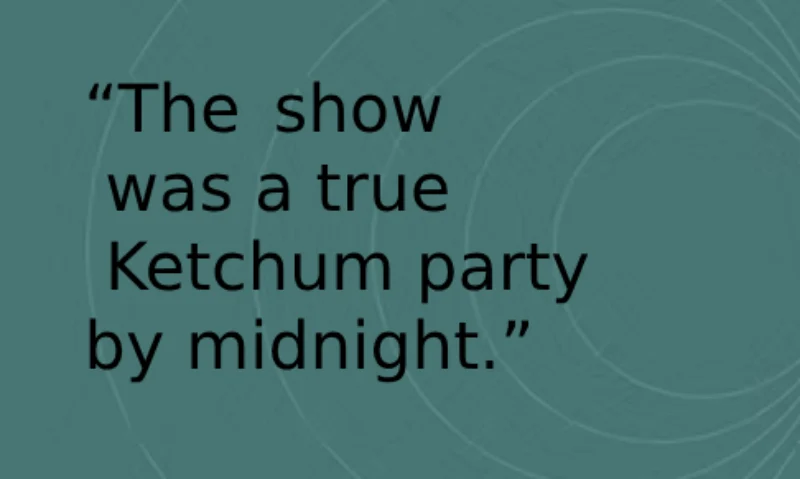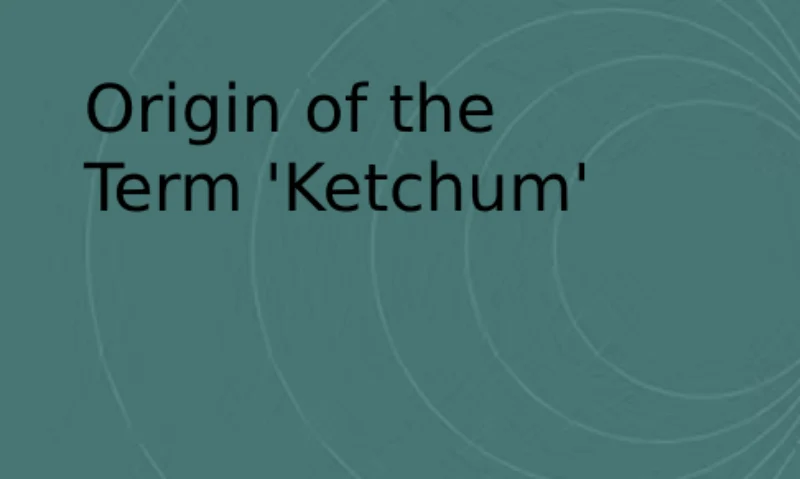Ketchum Meanings : Ketchum’ can have varied meanings and implications in different circumstances.
From English surname to modern day slang “Ketchum” has come a long way.
This post examines the many ways we can explain “Ketchum.” It covers a word’s history, and its meaning, offering some synonyms which might be useful depending on context.
Etymology and Origin

English Surname Origins
Ketchum is an English surname thought to be derived from the Old English personal name, “Cycca,” in conjunction with “ham,” or homestead or village.
This indicates that “Ketchum” was originally a habitational name denoting someone from a place named Ketcham or Catchem in England.
Or, some say “Ketchum” was an occupational name for a type of boat, based on the Middle English “ketch.”
This suggests that the name was adopted by fishermen or seafaring people.
Popular Culture Influence
In modern times, “Ketchum” became noticeable due to the official character in Pokémon game and anime, Ash Ketchum.
Ash’s surname, for a play on the franchise’s tagline, “Gotta catch ’em all,” to reflect his desire to collect all species of Pokémon. This affiliation has helped with the popularity and familiar association of the last name – particularly to fans of the series.
Contemporary Use and Slang Meanings
“Ketchum” has transcended historical and cultural significance and entered the realm of teen and internet slang for the digital age.
Slang Usage
In the colloquial, to be a “Ketchum” is to be, well, a Pokémon-like fervent, overly focused on a single goal or pursuit, sometimes to the detriment of pragmatism or second thoughts. This phrase is inspired by Ash Ketchum’s determination to become a Pokémon master.
Examples:
“He’s been grinding on his startup for months in a row — total Ketchum vibes.”
She studied all night for the test. Now that’s going full Ketchum.”
Other Myths Anagrams
Some also connect “Ketchum” with wild behavior or going off the rails, especially when at parties or using substances. Here, a “Ketchum party” is a wild party.
Examples:

“The show was a true Ketchum party by midnight.”
“After a couple of drinks he Ketchumed all over the dance floor.”
Contextual Replacements for “Ketchum”
Substitutes for “Ketchum”Depending on your context and the tone you want to set, there are a lot of options out there if you don’t want to use any “Ketchum.” Here are 11 such examples, ordered by formality and level of use.
Driven
Use: In formal and official situations.
Example: “Despite all of this, she is a motivated person who always meets her goals.”
Tenacious
Use: Literary or formal speech.
Sample: “It was his doggedness that brought the project to success.”
Persistent
Use: Moderate, all-purpose tone for most situations.
Example: “Her efforts finally paid off despite the setbacks.”
Go-Getter
Uses: Casual and personal.
Example: “He’s such a go-getter, always looking for new opportunities.”
Ambitious
Use: Ambiguous - Neutral to positive.
Example: “She’s ambitious, and it makes her succeed in her career.”
Zealous
Use: Formal, usually in religious or ideological contexts.
Example: “The volunteers were ardent in their support of the cause.
Eager Beaver
Use: Slang and vulgar.
Example: “He’s the eager beaver of the group, never being the first to arrive and never the last to leave.”
Hardcore
Use: Colloquial, frequently in youth speech.
Example: “She’s a serious gamer, spending hours trying to master each level.”
All-In
Slang for: Being all in among friends.
Example: “Once he decides to do something he is all-in.”
Overachiever
Use: From neutral to positive, serious intentional and lucky coincidental.
Example: “As an overachiever, she does better than other people expect.”
Workaholic
Usage: There is no positive connotation to this word.
Example: “His workaholic way of being occasionally has a bearing on their private life.”
Selecting the Appropriate Counterfactual
The answer that is best for you depends on your context, audience, and–well–your tone.
For a more workplace acceptable word, “driven”, “tenacious”, or “persistent” will suffice. “Go-getter,” “eager beaver” or “hardcore,” are perhaps better suited to informal conversation.
The implications of each of these terms need to be taken into account for communication to be effective.
Origin of the Term ‘Ketchum’

(“Ketchum” is a surname, commonly known to be associated with an individual or family). The specific etymology of the name is uncertain, but the most common suggestion is that it derives from the Old English term cicca “river” or “stream,” and by extension “a person who lived on or near a river or stream,” or from a place-name.
Over time, the name was applied to several locations, including Ketchum, Idaho, when that U.S. town boomed with new popularity as an outdoor recreation destination, particularly for skiing.
Ketchum Meanings in Popular Culture
Ketchum is also a widely recognized surname often made famous as Fictional character “Ash Ketchum” in Pokémon franchise. The protagonist, Ash Ketchum (known as Satoshi in Japan), is a Pokémon trainer whose surname was changed in the show’s American adaptation so that fans would recognize the English catchphrase “Ketchum all.” The name became a part of the lexicon of adventure, youth and aspiration in pop culture.
In some instances, the word “Ketchum” is also used informally to mean “catch them” or “bring them together”, namely in references like “Catch ’em all!” alluding to the series’ catchphrase, “Gotta catch ’em all!”.
This was a term that was given new life by the Pokémon franchise and has since been adopted in more general usage in other contexts/industries, like video games and slang.
Cultural and Linguistic Usage

Linguistically, “Ketchum” can generally be considered informal or onomatopoeic, sounding like “catch ‘”em”, and is generally used as an idiomatic expression, making it common, or generic, when claiming the act of capturing or taking into possession something. Where the phrase “catch ‘em all” was born: The phrase “catch ‘em” is typically used to describe setting or achieving a goal— something that’s actually fairly relatable when talking about completing tasks in real life.
The symbology of the word “Ketchum” has been employed in several promotional materials, typically emphasising the ideas of gathering, journey and resolve.
FAQS On Meaning of ‘Ketchum’
What does ‘Ketchum’ mean?
‘Ketchum’ can also be used as a surname or to denote a place (Ketchum, Idaho), or to be colloquially linked with Ash Ketchum, a central character in the Pokémon series. In popular culture, it’s often associated with the idea of catching or collecting something.
Ketchum: Real word or slang?
‘Ketchum’ is an actual last name and location. Like “maintain,” its formal meaning is generally rather abstract, but in informal contexts—thanks in no small part to the Pokémon franchise—it can be part of an informal or slangy way of talking about gathering or possessing (e.g., “catch ’em all”).
Who is Ash Ketchum?
5.Ash KetchumPikachu’s Trainer from the TV show Pokémon. His name is a pun on the expression “catch ’em,” of which it is a contraction, one of the saying of Pokémon: “Gotta catch ’em all.”
What is the origin of the name ‘Ketchum’?
‘Ketchum’ is probably of English extraction and a surname form of name. It could stem from ancient place names or geographical descriptions (like bodies of water or valleys).
What does ‘Ketchum’ mean?
Best associated with Ash Ketchum in Pokémon, the phrase stands for resolve, exploration and accumulation. It’s also rife in memes, social media trends and marketing campaigns.
Do people say “Ketchum” outside of Pokémon references?
Yes. Ketchum is both a place name and a family name. It is the formal term when used in those contexts, regardless of the animated series.
Is ”Ketchum” a metaphor?
Yes. In contemporary slang, especially among young people or Pokémon enthusiasts, it can also be repurposed as a metaphor for leaving on a quest or striving to achieve the great things you set out to do — e.g., “Time to go full Ketchum!”
Is ‘Ketchum’ a common name?
The surname is not very common, but is known as a surname in English-speaking countries and used to a modest extent as a family name.
Conclusion
It’s a name with layers: from the family name of old England to today’s street lingo created by popular culture.
The word “Ketchum” is loaded with meanings that history, geography and popular culture have bestowed upon it. Though it originally started as both a surname and a place name, its claim to fame in current culture is largely credited to the popularity of the Pokémon series, which turned Ash Ketchum into a worldwide emblem for drive, passion, and the call of the wild. Nowadays, “Ketchum” is more than just a name.”A form of Ketchum has become a cultural term that people casually thrown around and even a branding tool,” he says.
It’s interesting to read and learn about the meaning/use of “Ketchum” and how the language changes form and shifts in the context of people and places. As a name, a symbol, or pop cultural reference, “Ketchum” shows us the power of language to link people, to allow the stories to be told, to spawn action.
Knowing how it is used in different contexts helps you to communicate more precisely, make better word choices and express things more clearly.








